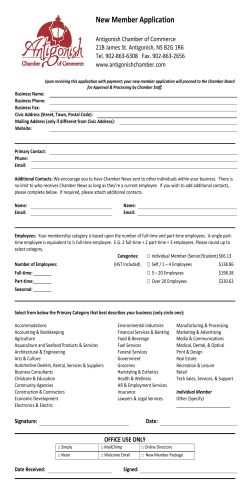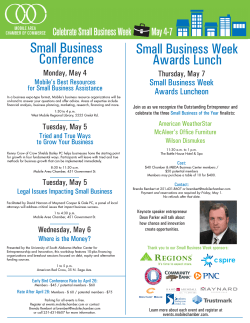
TOC Congress Procedural Rules 2015
National Debate Tournament of Champions • University of Kentucky 2015 Schedule Revised April 1. Saturday, April 25 8:00am Chambers Released & Judge Briefing 8:30am-11:00am Session 1 (Morning Hour) 11:00am -12:00pm Lunch (Use Voucher; Stud. Ctr.) 12:00pm - 3:15pm Session 2 3:45pm - 7:00pm Session 3 Rules 1. 2. 3. 4. 5. Debate Congressional Debate Congressional Sunday, April 26 8:15am-11:30am Session 4 11:30am-12:45pm Lunch (Stud. Ctr. Grnd. Ballrm) 12:45pm - Assembly (TBA) 1:00pm - 3:45pm Semifinal Session 1 3:00pm - 6:45pm Semifinal Session 2 Monday, April 27 8:00am-10:00am Awards (Campbell House) 11:00am or ASAP Final Session (Campbell House, Room TBA) 2:30pm Final Session Adjourns Awards completed by 3:45 p.m. Changes for 2015 are highlighted in yellow. Chamber assignments will be released Saturday morning, posted on the main floor of the White Hall Classroom Building. Students are issued school codes, and should not reveal their school identity publicly in a chamber. This maintains the integrity of competition, and allows judges to write codes on evaluation sheets to assist Tab staff in sorting them after sessions. For each session (including both semifinals), a presiding officer is elected, precedence and recency reset, and debate on legislation may not carry over. Once elected, presiding officers may not step down to speak. All speeches, except in finals, are 3 minutes, with a 2-minute questioning period for sponsor and first negative speeches, and 1 minute for subsequent speeches. Direct questioning, 30-second blocks, will be used for all speeches in all sessions. A PO must force previous question after two subsequent speeches on the same side, unless an opposing side speech is recognized. This is not to merely “frown on one-sided debate” nor reference “cycles.” This is about keeping debate fresh and clash-worthy. Students should not assume they are guaranteed a speech on each legislation; they should be prepared on all items in the docket. Students are permitted to access the Internet during the session for research purposes only. Direct or indirect electronic communication with a coach or other person during the session is prohibited. The TOC makes no guarantee of Internet access. Preliminary Session 6. 7. 8. There will be eight preliminary chambers of 15-16 students each. Two judges are assigned in rotation to each chamber, as well as one designated parliamentarian. Each judge ranks eight (8) contestants (presiding officers are eligible). After Session 4, the parliamentarian selects the best presiding officer (PO) from among the four who served in the preliminary sessions – to advance to semifinals. The remaining five (5) top delegates in each chamber – based on lowest rank totals – advance to the semifinal session. Of the 8 Presiding Officers who advance, 6 will be chosen to preside in semifinals. The remaining two will advance, but will not serve. The top 6 will be chosen on the basis of total points received from the scorers and parliamentarian during their time presiding. The PO during morning hour will have his/her points normed to reflect the difference in session length. MORNING HOUR (Session 1): legislators address an issue of importance to themselves or their constituents. a. Legislators have three (3) minutes to deliver morning hour speeches. The topic may be of national concern or a state/local problem that Congress has the ability to remedy. The topic of the speech may not be the same as any legislation scheduled for debate at the TOC, nor should legislators simply deliver an old speech on a bill/resolution. Creativity, originality, and seriousness of purpose are encouraged in the creation and delivery of a Morning Hour speech. b. The PO recognizes each legislator once. There are no “pro/con” speeches, so after each speech the PO calls for the next legislator who wishes to speak. The PO also recognizes delegates for a two-minute, direct questioning period. The PO is not permitted to give a Morning Hour speech, nor ask questions of speakers. Judges will consider quality of questions asked, and while friendly questions are permissible, they are discouraged in favor of more meaningful interaction. This should influence ranking, too. c. Judges are given a modified evaluation sheet for this time period and will be briefed carefully. Criteria include fluency of delivery, the use of persuasive evidence, etc. Each legislator is expected to demonstrate that he/she has carefully prepared for this polished presentation. Refutation of previous speakers is permissible, but not required. For example, a speaker who gives a speech in favor of a policy may respond to a previous legislator’s comments opposing that same policy. Effective analysis of unique topics not often found in Congressional Debate, such as highly localized issues, should be rewarded. Semifinal Session 9. There will be three semifinal chambers of 16 students each. Two, three, or four judges are assigned each session to each chamber, as well as a parliamentarian. Each judge ranks eight (8) contestants (inclusive of presiding officers). The better-ranked PO, selected by the parliamentarian, shall advance to finals. The remaining top four (4) contestants in each chamber shall advance to finals. 10. Two of the six advancing POs will be assigned to each chamber, and the parliamentarian shall flip a coin to determine which session each presides. Precedence and recency resets for each semifinal session. Final Session 11. Finals shall consist of 15 students, three of whom are the top PO advanced from each semifinal chamber. At least three judges (one designated parliamentarian) rank eight (8) contestants (in finals, exclusive of presiding officers). 12. Speeches are four minutes, with the same questioning parameters used throughout the tournament. 13. Each of the three POs shall serve for eight floor speeches, and may not give a speech during the final session. Each PO will draw a random number to determine order of presiding. The champion presiding officer shall be selected based on judge ranking in the final round, with ties broken by the final session parliamentarian’s rank. The runner-up final session POs will be recognized as “Presiding Officer Finalists.” 14. The session ends when all speakers have spoken twice, or at 2:30 p.m., whichever comes first. Placement of the top six speaking contestants shall be calculated in the same manner as advancement is described above. Remaining students are honored as finalists. -1- National Debate Tournament of Champions • University of Kentucky Debate Congressional Debate Congressional Procedures The following rules are designed to promote procedural unity among the chambers. They cannot be altered or ignored by a chamber through the use of a motion to suspend the rules. 1. DECORUM: The PO is responsible for enforcing proper decorum. Moving to suspend the rules for an open chamber is out-of-order at the TOC. 2. Each session constitutes its own legislative day, however, for NFL merit points, each calendar day has a recording limit of 24 points. Debate on legislation may not be carried from one session to the next, so each session must conclude with orders of the day, where students vote on legislation. 3. RECOGNITION OF SPEAKERS: There is some question as to recent trends that attempt to “randomize” recognition before precedence and recency are set (such as “Activity” or “Longest Standing”). Those are now illegal as per NSDA rules. It is entirely acceptable for a PO to simply say s/he will randomly call on speakers. The PO’s recognition method is subject to critique by judges. Seating charts, precedence and recency reset for each session (including each semifinal session). Following earlier sessions, POs may take speaking order from previous sessions into account, any may even employ a “reverse recency,” so that someone recognized late in an earlier session has the opportunity to speak earlier in a new session. 4. QUESTIONING: The PO recognizes legislators who wish to question a speaker using the direct questioning guidelines. The PO should strive to be equitable and fair, and the parliamentarian will monitor for flagrant abuse. 5. AGENDA ORDER: Each chamber will establish its own agenda order by majority vote. 6. OPENING DEBATE: Whomever begins debate on legislation introduces that item to the chamber. Since none of the legislation in the docket has been submitted by contestants, the PO will recognize a SPONSOR based on recency; this sponsor is held to the standard two-minute questioning period under any session. 7. VOTING: The PO determines the method of voting on each question before the chamber. Notes on voting: a. Final votes on legislation, amendments, and motions to appeal the chair require a recorded vote. b. Voice voting is acceptable for all other votes, but a recorded vote must be taken if any one legislator calls for a division of the chamber. c. A roll call vote is not permitted, since voting record is not of consequence in Congressional Debate. d. ALL simple majority votes are based upon the number of legislators PRESENT and VOTING in the chamber; therefore, the PO does not need to call for or count abstentions. For all votes requiring a fraction of the chamber to agree to a motion or question (2/3, 1/3, 1/5, etc.), the chair determines whether the chamber agrees with the motion/question using the number of legislators PRESENT in the chamber. Because of this system, the PO must track the number of legislators in the chamber at all times. 8. AMENDMENTS: Legislators submit amendments to the PO in writing. A motion to amend is necessary to consider the written amendment; such a motion is in order anytime after the SPONSORSHIP SPEECH. Once the motion is made, the PO decides if the amendment is germane. The PO may consult with the Parliamentarian to make this decision. If the amendment is found to be NOT germane, the chair rules it OUT OF ORDER and the amendment process stops. If the chair rules the amendment germane, s/he should read the contents of the amendment to the chamber. A 1/3 second of the members PRESENT in the chamber is required to debate the amendment. If the chamber votes a second, debate on the amendment commences immediately. Legislators may move to lay on the table or move the previous question on the amendment at any time. The first speech on the amendment is a SPONSORSHIP speech. The chair determines speaker recognition for the SPONSORSHIP speech on the basis of recency; the author of the amendment is NOT guaranteed the sponsorship speech. The sponsor accepts responsibility for the mechanics of the amendment and yields to two minutes of questioning. All amendment speeches receive a score and count towards recency. A majority vote is necessary for the chamber to adopt the amendment. 9. OVERTIME SPEECHES: Any regular floor speech that extends more than ten (10) seconds beyond the maximum speaking time of three minutes shall be penalized one (1) full point by the Scorer(s) evaluating the session. The PO is required to keep accurate time of each speech and report it to the Scorer(s) when the speaker has finished. The Parliamentarian/Scorer(s) shall heavily penalize the PO for inaccurate timing and/or reporting. Use of time by speakers is subject to judge critique. 10. For any circumstances not specifically covered by these rules, Congressional Debate at the TOC defers to NSDA rules, then to Robert’s Rules of Order, Newly Revised 11th Edition. Questions? Contact TOC Congressional Debate Director, Adam Jacobi • info@congressionaldebate.org Check www.congressionaldebate.org for legislation and important tournament updates! -2-
© Copyright 2025









